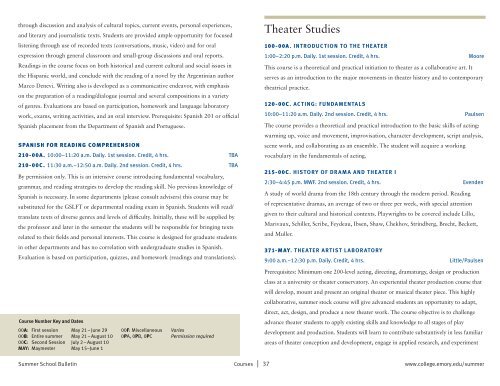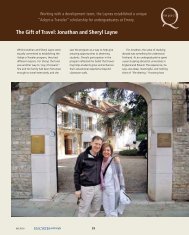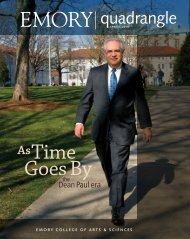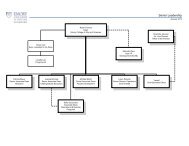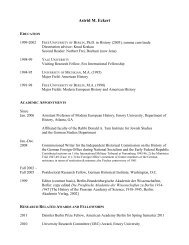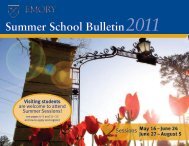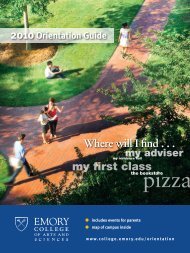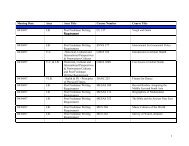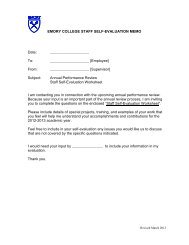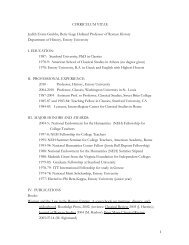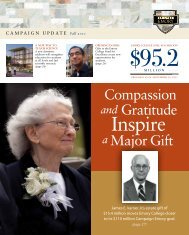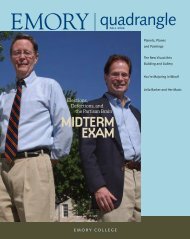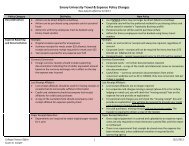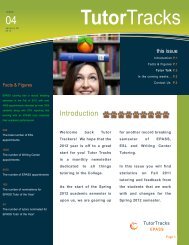2012 Summer School Bulletin - Emory College - Emory University
2012 Summer School Bulletin - Emory College - Emory University
2012 Summer School Bulletin - Emory College - Emory University
You also want an ePaper? Increase the reach of your titles
YUMPU automatically turns print PDFs into web optimized ePapers that Google loves.
through discussion and analysis of cultural topics, current events, personal experiences,<br />
and literary and journalistic texts. Students are provided ample opportunity for focused<br />
listening through use of recorded texts (conversations, music, video) and for oral<br />
expression through general classroom and small-group discussions and oral reports.<br />
Readings in the course focus on both historical and current cultural and social issues in<br />
the Hispanic world, and conclude with the reading of a novel by the Argentinian author<br />
Marco Denevi. Writing also is developed as a communicative endeavor, with emphasis<br />
on the preparation of a reading/dialogue journal and several compositions in a variety<br />
of genres. Evaluations are based on participation, homework and language laboratory<br />
work, exams, writing activities, and an oral interview. Prerequisite: Spanish 201 or official<br />
Spanish placement from the Department of Spanish and Portuguese.<br />
SPANISH FOR READING COMPREHENSION<br />
210-00A. 10:00–11:20 a .m . Daily . 1st session . Credit, 4 hrs . TBA<br />
210-00C. 11:30 a .m .–12:50 a .m . Daily . 2nd session . Credit, 4 hrs . TBA<br />
By permission only. This is an intensive course introducing fundamental vocabulary,<br />
grammar, and reading strategies to develop the reading skill. No previous knowledge of<br />
Spanish is necessary. In some departments (please consult advisers) this course may be<br />
substituted for the GSLFT or departmental reading exam in Spanish. Students will read/<br />
translate texts of diverse genres and levels of difficulty. Initially, these will be supplied by<br />
the professor and later in the semester the students will be responsible for bringing texts<br />
related to their fields and personal interests. This course is designed for graduate students<br />
in other departments and has no correlation with undergraduate studies in Spanish.<br />
Evaluation is based on participation, quizzes, and homework (readings and translations).<br />
Course Number Key and Dates<br />
00A: First session May 21 – June 29 00F: Miscellaneous Varies<br />
00B: Entire summer May 21 – August 10 0PA, 0PB, 0PC Permission required<br />
00C: Second Session July 2 – August 10<br />
MAY: Maymester May 15–June 1<br />
Theater Studies<br />
100-00A. INTRODUCTION TO THE THEATER<br />
1:00–2:20 p .m . Daily . 1st session . Credit, 4 hrs . Moore<br />
This course is a theoretical and practical initiation to theater as a collaborative art. It<br />
serves as an introduction to the major movements in theater history and to contemporary<br />
theatrical practice.<br />
120-00C. ACTING: FUNDAMENTALS<br />
10:00–11:20 a .m . Daily . 2nd session . Credit, 4 hrs . Paulsen<br />
The course provides a theoretical and practical introduction to the basic skills of acting:<br />
warming up, voice and movement, improvisation, character development, script analysis,<br />
scene work, and collaborating as an ensemble. The student will acquire a working<br />
vocabulary in the fundamentals of acting.<br />
215-00C. HISTORY OF DRAMA AND THEATER I<br />
2:30–4:45 p .m . MWF . 2nd session . Credit, 4 hrs . Evenden<br />
A study of world drama from the 18th century through the modern period. Reading<br />
of representative dramas, an average of two or three per week, with special attention<br />
given to their cultural and historical contexts. Playwrights to be covered include Lillo,<br />
Marivaux, Schiller, Scribe, Feydeau, Ibsen, Shaw, Chekhov, Strindberg, Brecht, Beckett,<br />
and Muller.<br />
371-MAY. THEATER ARTIST LABORATORY<br />
9:00 a .m .–12:30 p .m . Daily . Credit, 4 hrs . Little/Paulsen<br />
Prerequisites: Minimum one 200-level acting, directing, dramaturgy, design or production<br />
class at a university or theater conservatory. An experiential theater production course that<br />
will develop, mount and present an original theater or musical theater piece. This highly<br />
collaborative, summer stock course will give advanced students an opportunity to adapt,<br />
direct, act, design, and produce a new theater work. The course objective is to challenge<br />
advance theater students to apply existing skills and knowledge to all stages of play<br />
development and production. Students will learn to contribute substantively in less familiar<br />
areas of theater conception and development, engage in applied research, and experiment<br />
<strong>Summer</strong> <strong>School</strong> <strong>Bulletin</strong> Courses | 37 www.college.emory.edu/summer


